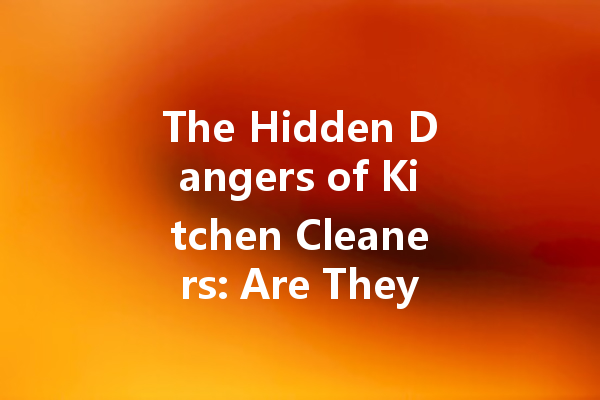When we think about cleaning our kitchens, the first thought that usually crosses our minds is how to make the space spotless and inviting. However, there’s a growing concern among consumers regarding the safety of various cleaning agents. Are these kitchen cleaners toxic? In this article, we will explore the types of kitchen cleaners available, their potential hazards, and some safer alternatives.
Comprendre les nettoyeurs de cuisine
Kitchen cleaners come in a wide variety of forms, from sprays and liquids to wipes and powders. These products are formulated to tackle grease, grime, and bacteria, ensuring our cooking spaces are hygienic. However, many conventional cleaning agents contain harsh chemicals that can be harmful to both our health and the environment.
Ingrédients courants dans les nettoyants de cuisine
Many popular kitchen cleaners include ingredients such as ammonia, bleach, and phthalates. These compounds are effective at breaking down dirt and killing germs, but they can also lead to respiratory problems, skin irritations, and other health issues, especially in poorly ventilated areas. Additionally, the cumulative effect of using multiple cleaners can pose a significant risk over time.
Are Kitchen Cleaners Really Toxic?
The toxicity of a cleaning agent often depends on its chemical composition and concentration. While some brands promote their products as eco-friendly or green, many still contain harmful substances that can release volatile organic compounds (VOCs) into the air. These emissions can contribute to indoor air pollution, which is linked to various health concerns, including allergies and asthma.
Health Risks Associated with Toxic Cleaners
Using toxic cleaning agents can lead to several adverse health effects. Common complaints include headaches, dizziness, and allergic reactions. Long-term exposure to these chemicals may even increase the risk of developing chronic respiratory issues or other serious health problems. Children and pets are particularly vulnerable to these dangers, as they may have increased exposure due to their smaller size and behavior patterns.
Recognizing Environmental Impact
In addition to health risks, conventional kitchen cleaners also pose environmental threats. Many of these products are not biodegradable and can contribute to water pollution when washed down the drain. This can harm aquatic ecosystems and disrupt the natural balance.

L'importance des alternatives écologiques
As awareness of these issues grows, more consumers are seeking eco-friendly alternatives that are safer for both human health and the environment. Eco-friendly cleaners are typically made from natural ingredients, such as vinegar, baking soda, and essential oils, which can effectively clean while minimizing harmful effects.
Pratiques de nettoyage sûres
Switching to safer cleaning products is just one step in maintaining a healthy kitchen environment. Here are some best practices to adopt:
Conclusion
While kitchen cleaners play a vital role in maintaining cleanliness and hygiene, it is essential to recognize the potential dangers associated with toxic chemicals. By opting for safer, eco-friendly alternatives and adopting responsible cleaning practices, we can create a healthier kitchen environment for ourselves and our families. Ultimately, making informed choices about the products we use can have a profound impact not just on our homes, but on the health of the planet as well.
